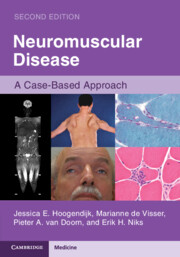Book contents
- Neuromuscular Disease: A Case-Based Approach
- Neuromuscular Disease
- Copyright page
- Contents
- Contributors
- Foreword
- Preface to 2nd Edition
- Part I Evaluation and Treatment of Patients with a Neuromuscular Disorder
- Chapter 1 Neuromuscular Diseases: Anterior Horn Cell Disorders, Peripheral Neuropathies, Neuromuscular Junction Disorders, Myopathies
- Chapter 2 History Taking and Clinical Examination
- Chapter 3 Differential Diagnoses by Presenting or Prominent Clinical Feature
- Chapter 4 Electrodiagnostic Studies
- Chapter 5 Imaging
- Chapter 6 Muscle and Nerve Pathology
- Chapter 7 Genetic Testing
- Chapter 8 Management
- Part II Neuromuscular Cases
- Video legends
- Index
- References
Chapter 6 - Muscle and Nerve Pathology
from Part I - Evaluation and Treatment of Patients with a Neuromuscular Disorder
Published online by Cambridge University Press: 29 November 2024
- Neuromuscular Disease: A Case-Based Approach
- Neuromuscular Disease
- Copyright page
- Contents
- Contributors
- Foreword
- Preface to 2nd Edition
- Part I Evaluation and Treatment of Patients with a Neuromuscular Disorder
- Chapter 1 Neuromuscular Diseases: Anterior Horn Cell Disorders, Peripheral Neuropathies, Neuromuscular Junction Disorders, Myopathies
- Chapter 2 History Taking and Clinical Examination
- Chapter 3 Differential Diagnoses by Presenting or Prominent Clinical Feature
- Chapter 4 Electrodiagnostic Studies
- Chapter 5 Imaging
- Chapter 6 Muscle and Nerve Pathology
- Chapter 7 Genetic Testing
- Chapter 8 Management
- Part II Neuromuscular Cases
- Video legends
- Index
- References
Summary
For decades, muscle biopsy has been considered an essential part of the work-up of patients suspected of a neuromuscular disease, alongside the physical examination, laboratory testing, electromyography, muscle imaging, and molecular investigations.
However, muscle biopsy is usually not the first diagnostic test requested when the clinical phenotype of a myopathic patient is clear (‘Gestalt’) and the molecular diagnosis is straightforward. For example, for patients with a phenotype of facioscapulohumeral dystrophy, Duchenne muscular dystrophy, or myotonic dystrophy, genetic investigations are the primary requested diagnostic tests. Since next-generation sequencing (NGS) has entered the diagnostic arena, a muscle biopsy is no longer a first-tier examination if a hereditary neuromuscular disorder – be it a myopathy, neurogenic disorder, or congenital myasthenic syndrome – is considered. Likewise, in patients with subacute weakness, especially if accompanied by skin abnormalities, the introduction of new serological markers has made the position of the applicability of muscle biopsy questionable according to some clinicians.
- Type
- Chapter
- Information
- Neuromuscular DiseaseA Case-Based Approach, pp. 47 - 51Publisher: Cambridge University PressPrint publication year: 2024

